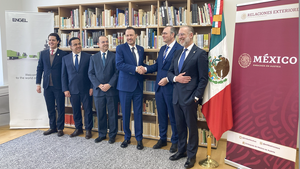Sign up for the PlasticsToday NewsFeed newsletter.
Sponsored By
Saudis seek processing future
Houston, TX—Instead of its world-leading 260 billion barrels of oil reserves, Saudi Arabia believes another number will be most important to its future: 50%—as in half of its population is 30 years old or younger, with many looking for jobs.
Tony Deligio
April 1, 2009
3 Min Read

Saudi Aramco
Houston, TX—Instead of its world-leading 260 billion barrels of oil reserves, Saudi Arabia believes another number will be most important to its future: 50%—as in half of its population is 30 years old or younger, with many looking for jobs. No longer content to simply extract oil from the ground and ship crude around the world, the kingdom is investing in refineries, chemical plants, resin manufacturing, and most recently, plastic conversion.Abdulaziz M. Judaimi, VP new business development at Saudi Aramco laid out his company’s and country’s vision for its future at Chemical Market Assoc. Inc.’s (CMAI; Houston, TX) Global Petrochemical Conference (March 25-26; Hilton Americas Hotel; Houston, TX) in a presentation entitled, “Taking a holistic approach downstream.”
As Judaimi addressed the crowd in Houston, some 13 million tonnes of petrochemical expansion is under way in Saudi Arabia, part of a broader plan that calls for the kingdom to expand upstream—with the addition 2 million barrels/day (mmbd) oil production and 1.5 billion ft3 of natural gas—as well as downstream, with a refining expansion of 1.2 mmbd. “All of these expansion plans are designed to support the kingdom’s economic base,” Judaimi says, as it works to address its demographic demands and “create jobs for our young and growing population.”
A big part of those plans is its PetroRabigh joint venture with Japan’s Sumitomo (for MPW’s initial coverage, click here). Currently it is in Phase 1, which includes the production of fuels, polyethylene, and polypropylene; Phase 2, which will come onstream in 2014, will add acetic acid, PC, SAP, MMA, EVA, TPO, cumene, and phenol. The first phase also has a 2.4 km2 industrial park that’s “ready for tenants,” according to Judaimi.
Khalid Alagil, director of the joint-venture development department at Saudi Aramco, told MPW his company has signed memoranda of understanding with 13 businesses, with another 27 in discussions. Although no tenants have moved in, the utilities, including electricity and water, as well as communications infrastructure, are all functioning. Alagil said companies showing initial interest run the processing/application gamut, including film, stretch film, nonwoven, molded pallets, pipe, and PP compounding businesses.
Aramco is also partnering with Dow Chemical on a converter park to be located across the peninsula on the Persian Gulf Coast at Ras Tanura, with that site slated for a 2010 startup. Announced in May 2007, the Ras Tanura Integrated Project will initially include worldscale production units for polyethylene, ethylene oxide, propylene oxide, glycol, chlor-alkali, vinyl chloride monomer, polyurethane components, epoxy resins, polycarbonate, amines, and glycol ethers. A conversion industries park is to be developed adjacent to the industrial complex targeting small-to-medium-sized industries.
More broadly, through its National Industrial Cluster Development Program (NICDP), the kingdom is planning manufacturing clusters for the automotive, construction, consumer goods, and metals processing industries. According to Judaimi, the goal is to create more than one million new jobs over the next five years. “We remain committed to our business plans even in this challenging business environment,” Judaimi said, adding, “We are committed to our domestic agenda and promotion of industrial clusters.” Saudi Aramco is asking its suppliers to locate in the Kingdom, promising long-term contracts and other incentives. —[email protected]
About the Author(s)
You May Also Like


